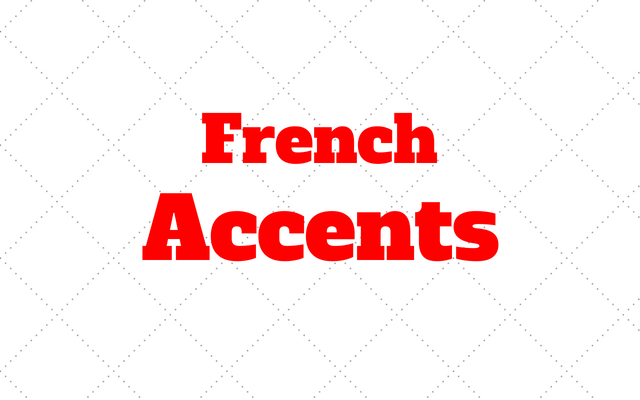
In French, accents are really important, they can influence the meaning and the pronunciation of a word.
For example:
‘ou’ means ‘or’
‘où’ means ‘where’.
The acute accent (l’accent aigu) ‘é’
It is only used on ‘e’ and changes its pronunciation to a more high-pitched sound.
Examples
un éléphant
an elephant
une médaille
a medal
J’ai regardé la télévision.
I watched TV.
un mélange
a mix
le café
the coffee
The grave accent (l’accent grave) è, à, ù
When it’s used on ‘e’, it changes its pronunciation to a deeper sound.
When the grave accent is used on ‘a’ or ‘u’, it doesn’t change its pronunciation, however, it sometimes changes the meaning of the word if you forget the accent.
Examples
J’achète du pain.
I buy some bread.
Il préfère ta voiture.
He prefers your car.
a: has
à: to
ou: or
où: where
The circumflex accent (l’accent circonflexe) â, ê, î, ô, û
It is an indication that in old French, an ‘s’ was used instead of an accent. For example, ‘a hospital’ in French used to be ‘un hospital’, the ‘s’ has been removed and an accent added on the ‘o’; nowadays, you spell it ‘un hôpital’.
Examples
un gâteau
a cake
une fête
a party
une île
an island
l’hôtel
the hotel
Tu es sûr?
Are you sure?
The cedilla (la cédille) ‘ç’
It changes the sound of the letter ‘c’ from ‘k’ to ‘s’. ‘ç’ cannot be used in front of ‘e’ or ‘i’.
Un garçon.
A boy
Nous sommes français.
We are French.
Ça va?
How are you doing?
The diaeresis (le tréma) ë, ï, rarely on ü
Vowels with a diaeresis are to be pronounced separately from the vowel preceding them.
Joyeux Noël !
Merry Christmas !
un aïeul
an ancestor
Israël
Israel






